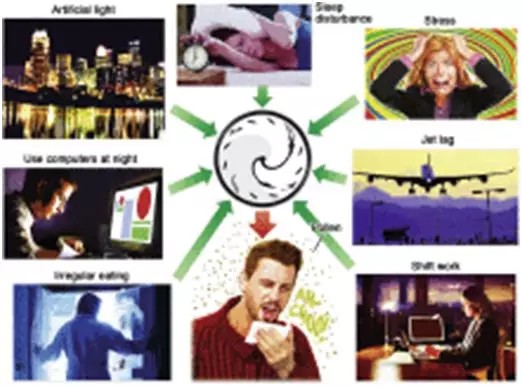JACI:生物钟可能严重影响过敏性疾病的进程
发布日期:2018-11-13
原标题:时间性过敏:生物钟是如何影响过敏的

延伸阅读

JACI
DOI: 10.1016/j.jaci.2018.08.007
Abstract:
Allergic disease is characterized by marked day-night changes in the clinical symptoms and laboratory parameters of allergy. Recent reports suggest that the circadian clock, which drives a biological rhythm with a periodicity of approximately 24 hours in behavior and physiology, underpins a time of day–dependent variation in allergic reactions. New studies also suggest that disruption of clock activity not only influences temporal variation but can also enhance the severity of allergic reactions and even increase susceptibility to allergic disease. These findings suggest that the circadian clock is a potent regulator of allergic reactions that plays more than a simple circadian timekeeping role in allergy. A better understanding of these processes will provide new insight into previously unknown aspects of the biology of allergies and can lead to the application of clock modifiers to treat allergic disease. Finally, this area of research provides a novel opportunity to consider how modern lifestyles in the developed world are changing the clinical manifestations of allergy as our society quickly transforms into a circadian rhythm–disrupted society in which sleeping, working, and eating habits are out of sync with endogenous circadian rhythmicity. Such findings might reveal lifestyle interventions that enable us to better control allergic disease.
Author:
AtsuhitoNakaoMD, PhD


——来自浙大迪迅
变态反应性疾病的特征是临床症状和实验室参数昼夜变化明显。最近的报告表明,生物钟在行为和生理上以大约24小时的周期驱动着生物节律,它决定过敏反应一天内依赖变化的时间。新的研究还表明,生物钟活动的中断不仅会影响时间节奏的变化,还会增加过敏反应的严重程度,甚至会增加对过敏性疾病的易感性。这些发现表明,生物钟是过敏反应的一个强有力的调节器,在过敏中起着比简单的生物钟更重要的作用。对这些过程的更好理解将为以前未知的过敏生物学方面提供新的见解,并可能导致应用时钟调节器治疗过敏性疾病。最后,这一研究领域提供了一个全新的机会,让我们考虑发达国家的现代生活方式如何改变过敏的临床表现,因为我们的社会正迅速转变为一个昼夜节律紊乱的社会,在这个社会中,睡眠、工作和饮食习惯与内源性昼夜节律不同步。这些发现可能使我们揭示更好地控制过敏性疾病的生活方式的干预。
延伸阅读

JACI
[IF:13.1]
Clockwork allergy: How the circadian clock underpins allergic reactionsDOI: 10.1016/j.jaci.2018.08.007
Abstract:
Allergic disease is characterized by marked day-night changes in the clinical symptoms and laboratory parameters of allergy. Recent reports suggest that the circadian clock, which drives a biological rhythm with a periodicity of approximately 24 hours in behavior and physiology, underpins a time of day–dependent variation in allergic reactions. New studies also suggest that disruption of clock activity not only influences temporal variation but can also enhance the severity of allergic reactions and even increase susceptibility to allergic disease. These findings suggest that the circadian clock is a potent regulator of allergic reactions that plays more than a simple circadian timekeeping role in allergy. A better understanding of these processes will provide new insight into previously unknown aspects of the biology of allergies and can lead to the application of clock modifiers to treat allergic disease. Finally, this area of research provides a novel opportunity to consider how modern lifestyles in the developed world are changing the clinical manifestations of allergy as our society quickly transforms into a circadian rhythm–disrupted society in which sleeping, working, and eating habits are out of sync with endogenous circadian rhythmicity. Such findings might reveal lifestyle interventions that enable us to better control allergic disease.
Author:
AtsuhitoNakaoMD, PhD
2018-10-31 Review
创建过敏性疾病的科研、科普知识交流平台,为过敏患者提供专业诊断、治疗、预防的共享平台。

开云电子(中国)官方网站 | 华亿首页(中国)网页版 | 开云网页版 | 天博手机网页(中国)有限公司 | 千亿体育线上平台中国有限公司 | 米兰手机在线登入 | 米乐官方网页版 | 华亿网页版 | 三亿体育首页(中国)网站首页 |
 华亿体育(中国)游戏平台
华亿体育(中国)游戏平台

